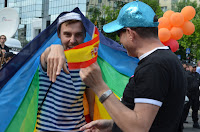Pardon my perhaps "aimless" reflection. Indulge me in this post. I promise some more investigative and interesting posts after this:
A dear friend of mine once describe me as a liminal person: always between one belief, place, status, identity or another one. I would say this may be true, but less because of liminality and more because of my own personal interest in both sides of the same coin.
Perhaps this is what draws me to Kosovo, South Ossetia, Abkhazia, Palestine, Nagorno-Karabagh and many other places that have a liminal status.
The fascinating thing about Kosovo is that I have seen it develop and change in three years now. Someone has joked to me that Kosovo is kind of like Hotel California. You can check in any time you like, but you just can't leave. You can stab it with your steely knives but you just can't kill the beast. Its a kind of place that endlessly has something to change, develop or grow. Because of the general openness of the population here, most things like national politics, information, gossip, networks, and news are in your grasp. Learning about how development, change, transitioning, and growth (or decline) after a high profile war is all at your finger tips here and there is a temptation to continue to watch where it goes.
In any case, I have seen Kosovo on the threshold of many different stages each year. When I first arrived in 2009 for only 4 short days in Kosovo, NATO (KFOR, the Kosovo NATO mission) was just beginning to pull out its street patrols in the capital. I could still see Italian troops in the street, guarding Mother Theresa street. Kosovars, still high from independence were very optimistic; I was, after all, at a youth entrepreneurial conference. Many internationals were very obviously still here. The following year, the first day I touched down in 2010 there was a some several thousand Muslims protesting for the right to wear hijab in school. A stray away from the farm? NATO still patrolled parts like Mitrovica and I witnessed IDPs that still did not have homes. KFOR billboards lined the streets and so did Tony Blair's face!
This year, I had to search for NATO cars and the billboards were not as obvious. Barbed wire still abound, but rusting everywhere, the first thing I see are Muslim protests in the street for the right to mosques. Major mergers in parties had occurred between a very pro-economic reform group and a seemingly anti-internationalist, near anarchist group (that had not been a political party until recently). One politician, recently charged with war crimes, had his party pay for billboards showing their support for him and denouncing any allegation of violent crime. Somehow, things were on a different stage entirely. People were restless. There were recent protests against government corruption as well. That said, the IDPs I had visited, now had houses. Something had developed and grown, though the main street (Mother Theresa) still had not been completed and was the same as it was last year. Kosovo seems to be a place that always changes but always stays the same.
Perhaps there is a constant state of limbo in Kosovo that is of interest to a scholar or journalist. The general openness of all the people here allows you to get a glimpse into everything from pop culture, corruption, islamic fundamentalism, politics, education, and the military. Though now 12 years after the war, Kosovo has a long way to go, but with every year, takes a step towards a new "inbetween." I am fascinated to see its direction and its development and have been honored to watch it.











 Of course, Poland is a traditionally ethnic country, and at the fringes of every Pride, there is always some not so proud people, held back by police (don't let this picture fool you, those police are just getting off duty).
Of course, Poland is a traditionally ethnic country, and at the fringes of every Pride, there is always some not so proud people, held back by police (don't let this picture fool you, those police are just getting off duty).



